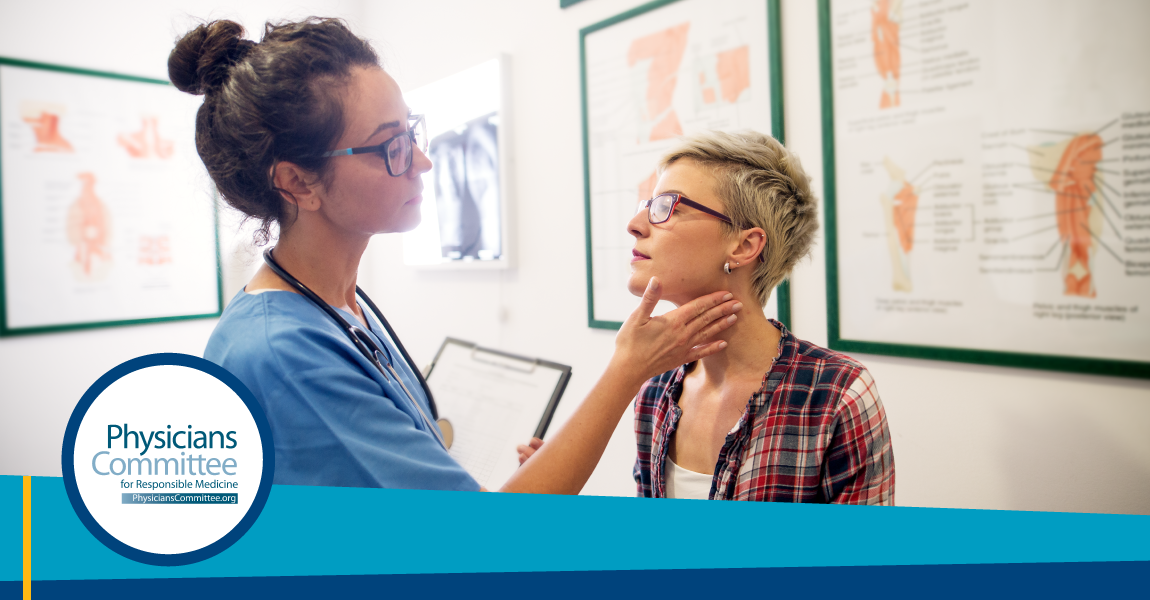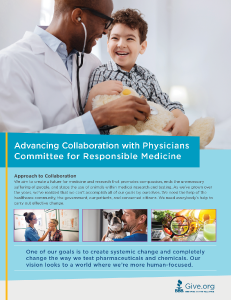
Advancing Collaboration with Physicians Committee for Responsible Medicine
About the Organization
The Physicians Committee is a 501(c)(3) nonprofit organization, headquartered in Washington, DC. that includes the clout and expertise of more than 12,000 physicians in its membership of more than 175,000 supporters across the United States and around the world. Our staff of physicians, dietitians, and scientists is working with policymakers, industry, the medical community, the media, and the public to create a better future for people and animals.
The efforts of our organization are dramatically changing the way doctors treat chronic diseases such as diabetes, heart disease, obesity, and cancer. By putting prevention over pills, healthcare professionals are empowering their patients to take control of their own health.
Featured Guest
Betsy Wason, CFRE
Vice President of Development
Physicians Committee for Responsible Medicine
Approach to Collaboration
We aim to create a future for medicine and research that promotes compassion, ends the unnecessary suffering of people, and stops the use of animals within medical research and testing. As we've grown over the years, we've realized that we can't accomplish all of our goals by ourselves. We need the help of the healthcare community, the government, our patients, and concerned citizens. We need everybody's help to carry out effective change.
Build Trust
Trust is vital in the work that we do. People look to us because they trust us. We focus on presenting evidence-based facts from a healthcare or scientific perspective. We conduct our own clinical research and generate evidence about the benefits of plant-based nutrition. Our research is used as the basis for news stories, recommendations for dietary guidelines, and is the focus of many films and documentaries. We are successful because we uphold the trust the public puts in our organization.
Have a Vision
One of our goals is to create systemic change and completely change the way we test pharmaceuticals and chemicals.
Our vision looks to a world where we're more human-focused. We've created coalitions with very unusual partners. Our coalition includes companies like DuPont and other big chemical companies that may be required to conduct pharmaceutical testing on animals. We've also brought in some environmental organizations and others that care about animal issues. Sometimes we'll demonstrate against or sue these companies, but at the same time, we're working towards a goal that requires their cooperation. We know we have to work together to modernize the future of research and testing.
Seek to Assure the Success of Your Collaborators
We make sure we're mindful of what our collaborators need. To do this, we do a lot of outreach and education within the healthcare community about the benefits of plant-based diets and how to prevent disease.
When we surveyed doctors, we discovered that many don't feel qualified to educate their patients about nutrition. We took that information, and we started providing free continuing medical education online for anyone to access, which also qualifies as the requirement for furthering education. Furthermore, we offer a medical conference every year so that like-minded practitioners can collaborate and healthcare professionals can get the latest updates on plant-based nutrition.
Many of our doctors will ask for ways they can relay information to their patients. We provide posters, brochures, books, lectures, and online videos to make it easy for doctors to disseminate and share information. Medical schools contact us and tell us they need an online curriculum, so we create courses for them.
While we can push our information all day long, without our collaborators — our doctors, nurses, dietitians — who are taking our knowledge and sharing it with their colleagues and patients, we wouldn't be able to achieve our intended impact. Our partners can spread the information more effectively on our behalf.
Take Stock
We've conducted significant research about plant-based diets. Now, it's a matter of spreading our research to as many people as possible to create a world where people can take the initiative to reclaim their health. Sharing and making this knowledge widely available has created an opportunity for mutually beneficial partnerships.
Start Small
We have built a successful partnership with the Navajo Nation to address a widespread battle with diabetes. Years ago, our diabetes team began to collaborate and assist the Navajo people with tackling the diabetes epidemic through a nutritional approach. We were initially met with skepticism, understandably, due to recurring outside groups coming in, wanting to fix things, and then leaving. We began with a meeting of one or two people, and over a decade of work together, we’ve come to be known as trusted partners and the success stories continue to mount, year after year. 2021 will bring more new programs and opportunities for collaboration.
The Physicians Committee works with Native Americans to use their own ancestral plant-based foods to treat, reverse, and prevent diabetes. The Navajo people have even adopted our materials and renamed them to be more relatable to the community. Today, we're collaborating with the Navajo Nation president, who has since gone plant-based, in hopes of creating widespread realization of what changing dietary habits can do to improve health. We look back at our growth and are thankful for this partnership that is saving so many lives.
We're constantly gathering feedback from our projects to gauge how things are going. Since we're stubborn with an end goal in sight, instead of backing out of partnerships when conflicts arise, more likely, we will change course and make the collaboration work.
Take a Portfolio Approach
We have many different campaigns and programs that involve collaborations. We have a balanced portfolio; some partnerships are small, and some require big thinking and collaboration to scale.
Consider Non-traditional Partners
We've been collaborating with companies that are carrying out testing on animals — the very testing we're trying to stop. However, we've established ourselves as trustworthy over the years by only dealing with evidence-based guidance and plans. As a result, our scientists are trusted by other scientists, and they call each other for advice or to talk about new methods. Our adversaries have become some of our greatest allies because they're willing to collaborate, step outside of their comfort zone with us, and work towards a better future.
We're also collaborating with places that could help us share information with large groups of people we wouldn't typically have access to, like airlines and universities. They might not necessarily have a healthcare focus, but we all have the same end goal and want to help people live healthier lives.
Keep Your Donors Apprised of Your Collaborations
Our donors are essential collaborators who want us to succeed, think big, and have the biggest impact possible. We always get a positive response when we share what we're working on with others to move our mission forward. We ask a lot of them in addition to financial support.
In 1985, our first campaign was launched to end the use of live dogs in medical school training. At the time, 126 schools were still using live dogs to train their future physicians. While we shut down lab after lab, we asked our donors to take an active role as collaborators in demonstrating with us, writing letters, making phone calls, signing petitions, and testifying on Capitol Hill. Thanks to our donors' actions, we were able to celebrate a victory in this campaign. In 2016, we saw the last medical school shut down its animal lab. We wouldn't be able to achieve all that we do without the collaboration of our donors.
Future Collaborations
We'd love to expand the collaboration we have with our government and work together to update the policies affecting so many lives. Since the United States is looked to as a leader on so many fronts, the updates we make to our nutrition policies, research, and testing protocols, will continue to have a worldwide impact.
This article was composed by Rachel Romana Liu.



